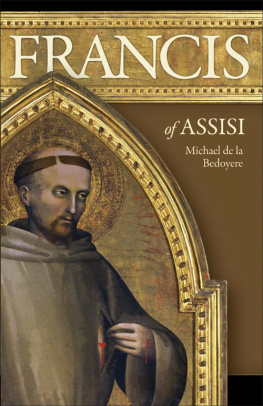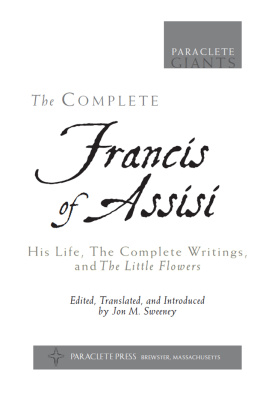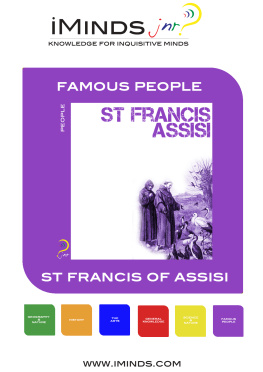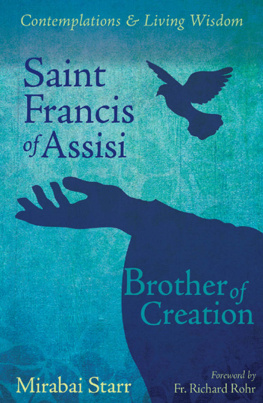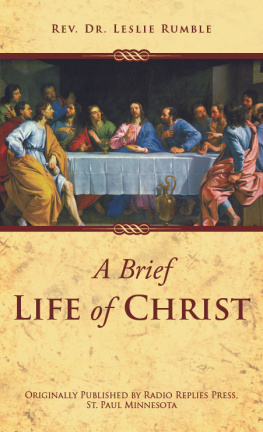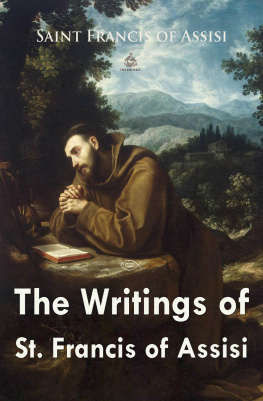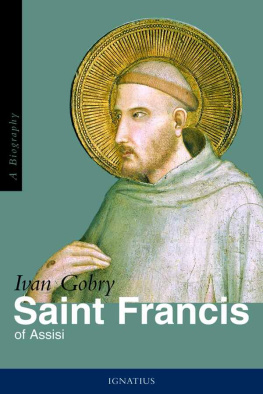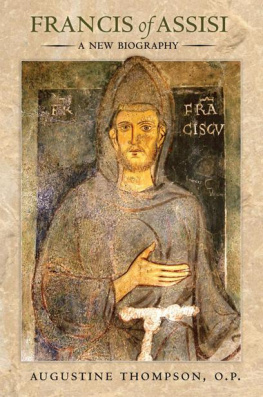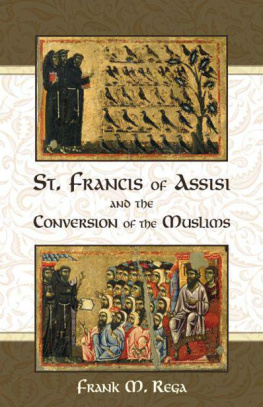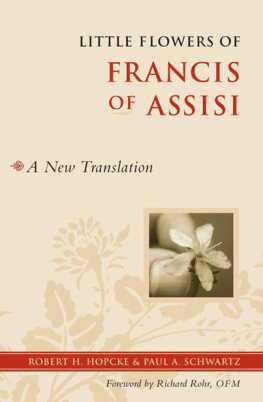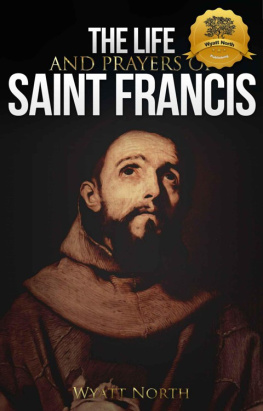Francis of Assisi
Also available from
Sophia Institute Press
by Michael de la Bedoyere:
SaintMaker:
The Remarkable Life of Francis de Sales,
Shepherd of Kings and Commoners,
Sinners and Saints
Michael de la Bedoyere
Francis of Assisi
The Man Who Found Perfect Joy
SOPHIA INSTITUTE PRESS
Manchester, New Hampshire



To L.,
nearest and dearest
Contents
.............................. ix
.............................. xi
............... 3
................. 13
.................. 25
............. 41
.................. 53
................... 65
............... 75
............. 87
................... 151
...... 171
....... 187
.............. 199
........... 217
............... 231
.................. 275
.......... 287
....................... 325
Chronology
1182
Francis is born in Assisi.
1202
Francis joins in the battle of Collestrada or Ponte San Giovanni, and is taken prisoner.
1203
Francis is released from the Perugian prison.
1205
Francis embraces the leper.
1206
The Crucifix speaks to Francis in San Damiano.
1206-1207
Francis is tried and renounces his father.
1209
Francis hears the Gospel words at the Portiuncula (February 24); Giles joins Francis (April 23).
1210
Innocent III approves the first rule.
1212
Clare joins Francis (Palm Sunday).
May 9, 1213
The Lord Orlando gives La Verna to Francis and his followers.
1216
Honorius III approves Portiuncula Indulgence.
1217-1218
Francis sends out missionaries to foreign lands, befriends Cardinal Ugolino, and appoints Peter Catanei as minister general.
1219
Francis embarks on a missionary journey to Egypt and the Holy Land.
1220
Francis visits Rome, where Cardinal Ugolino is appointed cardinal protector of the order.
March 10, 1221
Peter Catanei dies, and Elias succeeds him as minister general.
1221-1223
Francis drafts later rules; Pope Honorius III approves the Rule of 1223 (November 20).
1222
The Chapter of Mats convenes.
1224
Francis receives the
Stigmata on Mount La Verna.
1225
Francis composes the "Canticle of the Sun."
October 3, 1226
Francis dies at the Portiuncula.
Introduction
Few years go by without the appearance of a new life or study of Giovanni di Bernardone, universally known as Saint Francis of Assisi. Such is the measure of his popularity, not only with Christians generally, but with many others who would hardly think of interesting themselves in the life of any other saint of the Church's calendar.
There is, however, a further explanation of this popularity and the need felt by so many writers to study the life and character of Francis. It springs from the contrast between the relatively little we know for certain about him as a man among men, who lived between the years 1182 and 1226, and the immense amount we know about his formative influence on posterity. He was one of those key figures in Western history who cast a spell on the world.
As Renan said, "An anecdotal and legendary history can be truer than truth itself, for the glory of the legend belongs to the man who has known how to inspire his humble admirers with the values that, without him, they would never have discovered." And Remy de Gourmont (anything but an orthodox Christian) wrote, "No man since Saint Paul has had an equal influence on the orientation of the human spirit as the founder of the Friars Minor: a new poetry, a new art, a renewed religion have radiated from the humble Portiuncula convent through the Christian world."
This unlearned, humble little poor man of Assisi has in some way touched men and women of every generation. In him they have found a neighbor, a friend, an inspiration that has transcended the accidents of space and time and even of ideological outlook.
But to be able to say so much is very different from being able to retell the life of Saint Francis in such a way as to show and illustrate just where and why and how Francis succeeded in somehow irradiating - and also judging - not only his contemporaries and immediate followers, but also posterity. He left but a few pages of writing which can for certain be attributed to him, although they happen to include the first great poem written in the common tongue of his time. The chronology and incidents of his life have for generations been subject to higher textual criticism which requires a scientific training for proper judgment and appreciation. And as for the vast number of reported sayings and stories of his "legend," these can only be judged and used with the help of some "sixth sense" which enables the biographer to sift authenticity from part-authenticity or the fairy tale that the uncritical writers of those times judged to be edifying.
The contemporaries of Francis of Assisi had very little idea of what we call the empirical or critical spirit which for us is the necessary basis of our judgment of a man's record. They lived in a fixed world of Divine Revelation, known through faith as certain, and a closed universe whose center was the earth and whose boundary was the visible blue vault of heaven. Their primary aim was to work out the logical implications of the truths of Revelation within that closed universe, the understanding of which they had inherited from classical antiquity. They did this with consummate skill where the fundamental truths about human destiny and conduct were concerned, and it is only in matters of science and its enormously important application to the temporal ways of human living that we have to adapt what they taught. God, Revelation, and the human spirit were the only matters supremely important to them. Therefore, they were only moderately interested in mere, apparently unrelated, facts and in biographical and historical accuracy.
Yet we should not exaggerate this relative disinterest in accurate record, nor suspect all that they had to say about a saint like Francis of Assisi. In fact, it is surprising how well the record stands up to scholarly criticism. But it is significant that the story of his life was first told in legenda. Legend did not then mean fairy tale or made-up story - the invention of its author. It meant exactly what it said: "something to be read." Its first purpose was edification, but it was edification based on truth. But where edification is the first object, the most impressive of the various accounts was likely to win the day - and nothing was more impressive than any "legend" of God's direct and miraculous intervention in the life of a holy man.
It seems to me that against this background it is justifiable and indeed inevitable that the modern biographer, who makes no pretense to the scholarship required for the scientific assessment of the conflicting sources, should rely in the main on his own insight and flair to present his hero as a living and credible man whose behavior and character we in this age can understand - a man whose personality and actions provide a clue to the profound influence he still exerts on us in this day and age.


